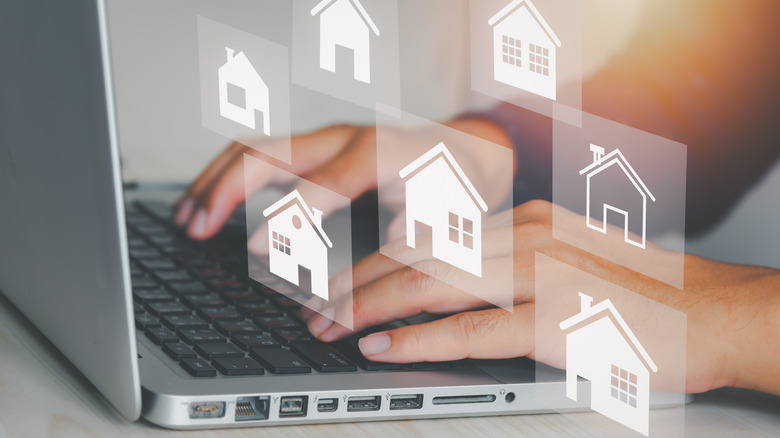3 Important Things To Ask Your Lender Before Refinancing
For a lot of people, a mortgage can be the most serious and long-lasting relationship in their life. According to LegalJobs, the average length of a marriage in the U.S. is 8.2 years, whereas the shortest-term mortgage most people can hope to get will last for 15 years. What's more, the most common mortgage term is almost four times as long as the average marriage at 30 years.
However, just because it's a long-term commitment, that doesn't mean there's no wiggle room for changes. In fact, per The Ascent, almost 25% of U.S. homeowners adjusted their mortgage in 2021 via refinancing.
Simply put, refinancing is when you take out a new mortgage on your home, hopefully getting yourself a better deal in the process. It can save you a lot of money in the long run or help with short-term cash flow, depending on what you need.
But, just like any long-term commitment, you shouldn't just take the first offer you get at face value. Though it might not feel as scary or serious as getting your first mortgage, refinancing is still a big deal. It's also a two-way street, you wouldn't undertake something like this without being certain of your own situation — so it's also important to clarify important details with your lender before taking the plunge. Here are three considerations to be especially aware of and questions you should ask before refinancing your home.
1. What are my refinancing options?
There are different types of refinancing you might benefit from. However, not all mortgage providers provide all these options; some providers don't accept applications for certain types of loans. For example, Rocket Mortgage doesn't accept (at this time) government-backed USDA loans.
Another thing to consider is whether you're refinancing for long- or short-term reasons.
If you're a relatively new homeowner and/or able to take a long-term view, you'll be most interested in rate-and-term refinancing. According to NerdWallet, this type of refinancing is a way to readjust the terms of your mortgage in your favor, but without a big cash payout. You'll take out a new mortgage with a different (i.e., lower) interest rate, repayment terms, or some other beneficial change, and the balance will be within $2,000 of your previous mortgage.
If you've been paying your mortgage off for a few years at least, and/or need to access the money locked away in your home as equity, then cash-out refinancing is likely what you're looking for. Investopedia defines cash-out refinancing as a home loan that allows you to convert your home equity into cash. You'll get a new mortgage, where the balance to repay is higher than your current mortgage, and the difference will come back to you as a cash lump sum.
2. How much is refinancing going to cost me?
According to Freddie Mac, borrowers who refinanced in 2021 saved an average of $2,700 annually. As great as this is, there's no such thing as free money, and there are costs associated with refinancing.
Per CNBC, you should expect these costs to equal 2% to 4% of the total loan value. Just like a mortgage taken out on a newly purchased home, a refinancing mortgage still requires appraisals, legal fees, and underwriting. Getting clarity on the costs of refinancing with your lender is critical in being able to make an informed decision on whether refinancing is going to be worth it for you.
A lot of lenders are going to make very similar calculations when it comes to numbers, such as your credit score, house value, and interest rates. Closing costs, however, can vary a lot between lenders, so it's worth shopping around to find the best deal. Remember, saving $2,700 a year on your mortgage payments is great, but if it costs you $27,000 to do so, it's still going to be a decade before you've actually made any profits.
3. What will happen to my monthly mortgage payments?
This is the bottom line of any refinancing conversation with your lender. As Forbes points out, certain types of refinancing can actually increase your monthly mortgage payments. Still, that might benefit you in the long term by decreasing the amount you'll pay off overall, shortening the time until you're mortgage-free, or providing you with a way to access a large amount of cash versus other methods.
But increasing your monthly financial obligation is still a serious thing to consider and commit to, and if you miscalculate your ability to deal with higher monthly mortgage repayments, your home could be at risk.
Conversely, if you have an interest rate on your mortgage that's higher than today's current market rates, and/or you've improved your financial situation and so are eligible for a lower rate, according to Bankrate, you could see a dramatic decrease in mortgage costs (monthly and overall) thanks to refinancing.
If you're hoping to negotiate this sort of refinancing, then you need to get your lender's estimation of your monthly repayments and associated closing costs in order to evaluate whether or not you go ahead with the refinancing process.



